

|
Jordan, along with other countries, observes this day every five years in accordance with a UN General Assembly resolution. This year's observance coincides with the 80th anniversary of the establishment of the United Nations, which led to the creation of statistical organizations including the International Statistical Committee and the Population Division. This year's World Statistics Day is held under the theme "Accurate statistics and reliable data drive change and create a better future for all," highlighting the importance of data and its role in enabling informed decision-making by all relevant national entities. |
|
Accurate statistics form the foundation upon which public policies and executive plans are built. They enable governments and various institutions to assess the demographic and services situation, make transitions to action to respond to future needs, and achieve sustainable development. |
|
The Higher Population Council is not a data-producing entity but relies on data in its work. Therefore, it strives with all its technical capacities to play an active role in the national statistical system led by the Department of Statistics. The Council recognizes its responsibility to contribute to improving the quality of data continuously generated by ministries and departments with administrative records that provide indispensable digital information about Jordanian and non-Jordanian populations. Consequently, the Council has worked and continues to work with the Department of Statistics, Ministry of Health, the Department of Chief Islamic Justice, the Civil Status and Passports Department, the Residency and Borders Department, the Ministry of Digital Economy and Entrepreneurship, and the Social Security Corporation to enhance the statistical products derived from the administrative records of these national entities. This is done by seeking to increase their completeness and level of detail in accordance with international recommendations, foremost among them the Fundamental Principles of Official Statistics, and to make the data responsive to the needs of all entities that require it. |
|
Accurate and reliable statistics are the cornerstone for measuring the performance indicators of the 2030 Sustainable Development Goals, their targets, and benchmarks. They enable decision-makers to monitor progress across various sectors, identify existing gaps and challenges, and formulate evidence-based policies. The national statistical system in Jordan plays an active role in supporting the implementation of the Economic Modernization Vision 2033 by providing up-to-date data covering demographic, economic, social, and environmental aspects. |
|
In recent years, Jordan has witnessed significant development in the field of statistical work at the official national level. This has been achieved through continuous efforts to enhance national capacities in data collection, analysis, and dissemination, leveraging modern technology, developing electronic platforms that facilitate easy and transparent access to information, and establishing academic data science programs in universities. Recently, a set of relevant legislation has been issued, including the Law on Guaranteeing the Right to Access Information; updating the General Statistics Law and the Personal Data Protection Law; updating the National Statistical Strategy; and the establishing the National Information Center at the Department of Statistics, which is currently preparing to conduct a new population and housing census. It is also noteworthy that Jordan holds a prestigious international position in terms of data availability and quality. |
|
On this day, the Higher Population Council recommends continuing efforts to enhance statistical literacy and public trust in official statistics among various segments of society, including students, researchers, media professionals, and decision-makers. It calls for increased support and cooperation in providing accurate data collected for national, non-personal purposes to support sound decision-making. Statistics are no longer merely a technical tool but a global language for understanding societal and economic transformations, and an indicator of a country's development and institutional strength. It is also crucial to emphasize the importance of encouraging cooperation and coordination between national and international institutions to exchange statistical expertise and knowledge; build an integrated information system that supports development and serves national interests across various fields; invest in statistical digital transformation through the use of artificial intelligence; analyze big data; build capacities in using modern technologies to improve the efficiency of data collection and analysis; launch regional initiatives for data and expertise exchange between countries; and strengthen partnerships with the private sector and academic institutions to develop innovative solutions for data analysis. |







